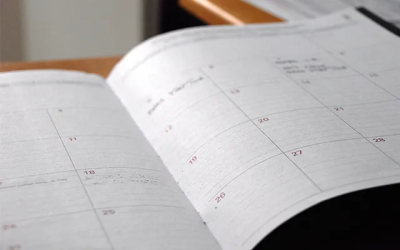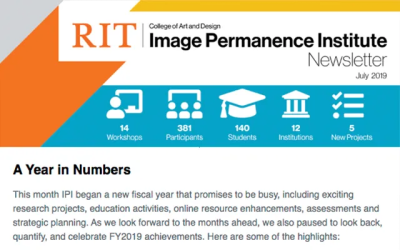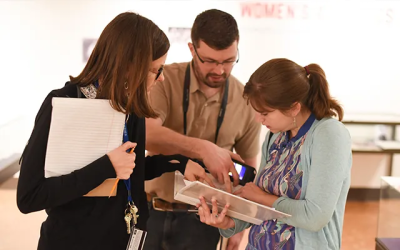Events
- RIT/
- Image Permanence Institute/
- About/
- Events
Upcoming Webinars
Webinar Series: Best Practice for Using the IPI Preservation Metrics to Assess Risk in Organic Collections
April 24 and May 8, 2025
When evaluating a collection space environment, one of the primary questions to address is: how can I quantify the risks to my collection? The IPI environmental metrics for decision-making, Preservation Metrics, were first developed in the 1990s to help collections care specialists 1) account for the complexities between deterioration of collection materials and their environmental exposure and 2) to provide balanced approximations of the risks posed by particular storage and display environments. This two-part webinar series serves as an introduction to using the IPI Preservation Metrics to evaluate and assess collection risks.
Webinar Series: Monitoring Collection Storage Environments
May 29, June 12, and June 26, 2025
Team Participation Encouraged - In collecting institutions an environmental management team that includes both collections and facilities staff can create a structure to environmental management that includes regular meetings of collections and facilities staff to review data, discuss strategy, plan for changes, and generally inform each other about what is going on in their respective roles. For this webinar series we suggest team participation and encourage facilities and collections staff to attend the webinar sessions together.
This sequential three-part webinar series will serve as an introduction or refresher course on the fundamentals of environmental monitoring of collections storage spaces. Each webinar summarizes key concepts outlined in IPI’s Guide to Sustainable Preservation Practices for Managing Storage Environments including understanding how environmental conditions influence the preservation of collections, collecting environmental data, and evaluating environmental data for collection storage spaces. The webinar will also discuss critical guiding principles for managing environmental conditions for cultural collections, and introduce field guideposts such as The Bizot Green Protocol and PAS 198:2012.
Preservation Performance and Reuse of Sealed Frame Packages for Transit and Display
August 21, 2025
Paper-based objects that are sensitive to changes in relative humidity (RH) are commonly enclosed in sealed frame packages (SFP) to create microclimates for transit or display. This webinar will summarize findings from a recent IPI research project in which twenty-six different SFP designs were investigated for their effectiveness at buffering against external RH changes. Following initial conditioning of paper-based objects and enclosure materials at 45% RH, dataloggers were placed inside each SFP and exposed to 70% RH for 12 weeks. The internal response of the SFPs to the external RH were quantitatively assessed, alongside qualitative assessments of material reusability.
Environmental Conditions in Shipping Crates During Transit
September 4, 2025
Historically, museum objects going out for loan travel by crate. As the cultural heritage profession looks to address sustainability, institutions are re-evaluating all aspects of museum operations, including how to address sustainability in crate design. Currently there is limited data documenting what environmental conditions objects actually experience in museum shipping crates while traveling. This webinar will summarize the results from a 3-year field study monitoring crate performance during travel. It will address the types of risks associated with temperature and relative humidity conditions in crates during travel and will highlight best practices when weighing environmental risk with sustainability.
Upcoming Workshops
Practical Introduction to Mechanical Analysis of Cultural Heritage Materials
October 14-16, 2025
This workshop will provide a theoretical and practical understanding of static mechanical analysis and dynamic mechanical analysis, with a view to characterizing the physical properties of organic heritage materials, and developing appropriate methodologies for conservation and preservation applications. Over the course of three days, participants will be introduced to the fundamental concepts of mechanical analysis and data analysis, and participate in practical laboratory sessions using tensile testers, dynamic mechanical (thermal) analysis, and dynamic mechanical (humidity) analysis. These sessions will be supplemented with case study examples from the field of conservation and preservation, including the analysis of paint, films, textiles, and adhesives, providing tangible examples of how mechanical properties can inform the treatment, storage and display of objects, mechanical test method development, and test limitations.
Photographic Print Identification
October 15-16, 2025
Location: Center for Creative Photography, University of Arizona, Tucson, AZ
The history of photography includes almost 200 years of generating objects that have many similar visual characteristics, but that were made using a wide range of different technologies and materials. When examining a photograph, viewers must evaluate the clues that the physical object itself presents to properly identify the photographic process(es) used to create the photograph. This skill—which is described in shorthand as ‘process identification’—is something that each new generation of scholars and collections stewards must develop for itself. This workshop will teach participants the tools and skills necessary for successful photographic process identification using a structured methodology and controlled vocabulary for organizing visual information, hands-on practice examining nineteenth, twentieth, and twenty-first century processes from IPI’s study collection, and instruction on how to use www.graphicsatlas.org as a reference resource for identification.






